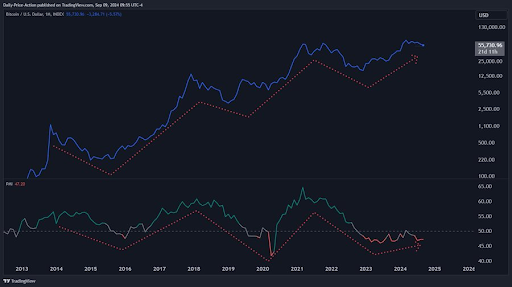Analyst Says Bitcoin 4-Year Cycles Are Over, Here’s Why
Popular analyst Justin Bennett has explained why the Bitcoin four-year cycle might be over for the foreseeable future. He indicated that the crypto’s projected price surge in this market cycle might not happen as planned and that Bitcoin could suffer a severe price crash soon enough.
Why The Bitcoin Four-Year Cycle Might Be Over
In an X (formerly Twitter) post, Bennett asserted that Bitcoin follows business cycles while explaining why the leading crypto might be on the verge of a new era. He noted that the leading crypto has been following the perfect four-year cycles since its inception, witnessing two years of a bear market and a bull market.
However, he suggested that this could be set to change since Bitcoin’s correlation with business cycles means that a contraction would end these four-year cycles. To prove that Bitcoin follows business cycles, Bennett highlighted how Bitcoin has tracked the US Purchasing Managers’ Index (PMI) from the start.

This index measures an economy’s health using the manufacturing and service sectors. The accompanying chart shows that BTC’s price has risen whenever the PMI does and drops whenever the index declines. In line with this, Bennett claimed that the correlation will still exist during the next short-term or long-term contraction.
Interestingly, this contraction might already be imminent, which is why Bitcoin’s four-year cycle could be over. The US PMI is at a current price level of 47.20, representing a contraction. A contraction is when a country’s economy is declining, which could be said of the US at the moment as the Federal Reserve struggles to bring inflation down to its desired target while avoiding a recession.
It is also worth mentioning that the US’s economic situation has majorly contributed to BTC’s stagnant price action since it reached a new all-time high (ATH) in March. Bitcoin investors have remained cautious as the US inflation data and job reports have shown how frail the US economy is.
What This Means For BTC’s Price
Bennett noted that Bitcoin’s correlation with business cycles doesn’t mean its price cannot move higher. However, he remarked that people need to understand that BTC is a risk asset fueled by the economic conditions of post-2008. He added that it is not “programmed to go up” as crypto analysts have projected, neither is it destined to follow a “rainbow chart or stock-to-flow model.”
The analyst’s perspective has undoubtedly cast doubt on bullish predictions based on halving cycles. Historically, Bitcoin hits new highs 16 to 18 months after the halving event. However, with Bennett suggesting that this perfect cycle might be over, this might not be the case this time. This cycle has already proven to be different, considering the flagship crypto hit a new ATH before the halving, which has never happened before.
At the time of writing, Bitcoin is trading at around $57,900, down almost 1% in the last 24 hours, according to data from CoinMarketCap.